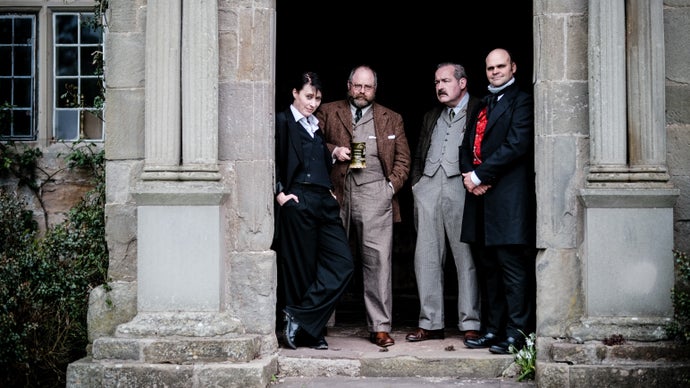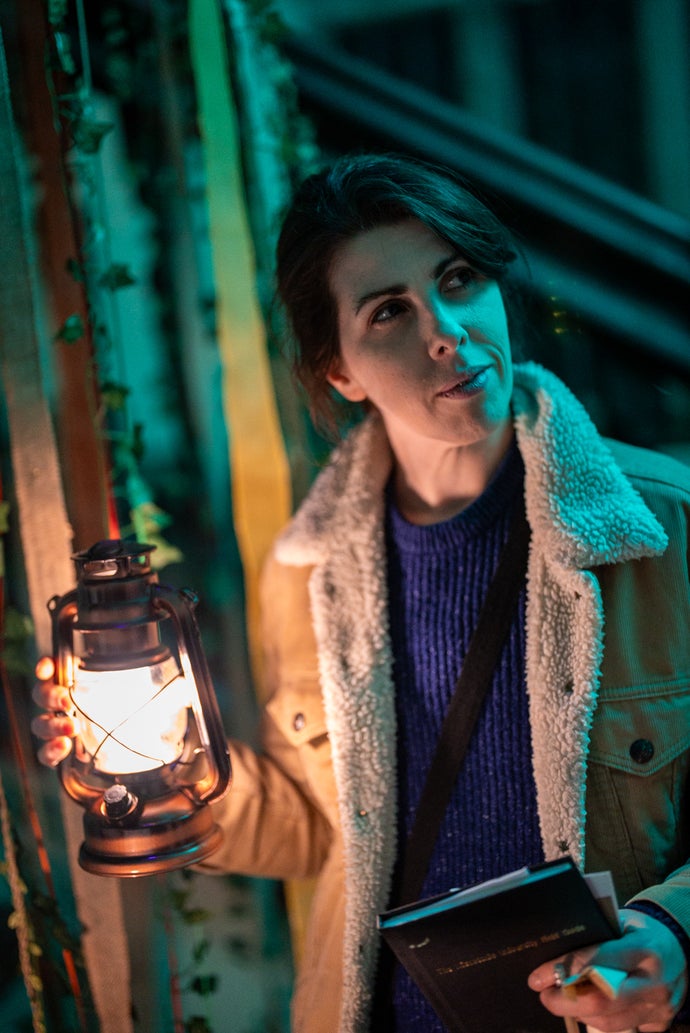Just up the road from Newport, in the countryside off the M40, a troupe of actors and backstage boffins are gearing up for a fresh season of strangeness.
Key of Dreams is billed as a unique blend of interactive theatre, puzzle solving and branching narrative spread over 24 hours in Treowen, a historic 17th century Welsh manor house you’ve likely seen on Doctor Who. Within its walls, Key of Dreams mixes the location’s real-world history with weird fiction tales inspired by the likes of MR James and HP Lovecraft, in an experience that allows guests to decide the fates of its various characters and guide how its intertwining storylines evolve.
Unlike other interactive theatre performances, such as those from the acclaimed Punchdrunk, Key of Dreams is designed to be a more influenceable experience, with less of an emphasis on following tightly scripted narrative in favour of something more open world. Launched last year to positive reviews and an endorsement from Neil Patrick Harris, a handful of guests have already made repeat trips, taking advantage of the fact Key of Dreams’ storylines are swapped in and out to keep its mysteries fresh, with an array of endings so no two visits are quite the same.
It all sounds ambitious, even for creators well-versed in the complexities of branching narratives, and yet its production company Lemon Difficult is still in its infancy. Five years ago, its founder and creative director Ivan Caric worked as a consultant for a telecoms company – until everything changed suddenly when his father died during Covid.
“I had a reassessment, I guess is a gentle way of putting it,” Caric tells me. “I had a bit of a breakdown.”
It was a moment to take stock, Caric says, and make a leap of faith to work on something closer to his personal interests: role-playing games, immersive theatre and – when he was a bit younger – running around playing LARP.
“I’ve done role-playing games, I love video games and I love immersive theatre,” he says, chatting with me via video call. “I wanted to create something that was an intersection of all of those, that took bits from each and yet was enjoyable for anyone not just into immersive theatre but also escape rooms, gaming, puzzles.
“Lots of immersive theatre doesn’t get what makes a good game,” he continues, “and that’s not necessarily a bad thing, they’re just trying to achieve something different. Whereas I’m interested in the mechanics, and how they make people feel.”

Key of Dreams has three main narrative pillars, each designed to appeal to various groups of visitors. Before each 24-hour session begins, players are invited to join one of several secret societies, which helps mix people together (though you can say no and join another with a friend if you so choose). Each group has its own goal, linking to the wider weird fiction mythos. Then there are the experience’s NPCs, its cast of four actors who live in-role throughout, with their own personalities and backstories to discover, and goals you can help or hinder. Finally, there are stories involving puzzles within the house itself (which for Christmas this year will feature Dickensian festive horror tales, Caric tells me).
“It’s a collaborative and a competitive experience, because there are these groups which are in competition against each other,” Caric says. “But because there’s this investigative vibe – there’s boards, red string – it does encourage cooperation.”
One of the key considerations for Lemon Difficult when engineering the experience was to make it something all guests – up to 30 at a time – can feel included within, rather than one where specific individuals end up being able to steer its outcome. Likewise, it is designed so that any guest who turns up determined not to engage won’t spoil it for the rest. Typically, however, this isn’t a problem.
“There’s a guy called Matthew Pennington who runs the UK’s biggest LARP,” Caric says. “His background is database admin – and he treats his LARP as software that he runs on people. You’re trying to encourage certain behaviours, rather than have concrete rules which say you can do this, you cannot do that. Obviously there are rules, there are certain things you’re not allowed to do, but you can nudge people into certain behaviours that can result in the effect and in the world that you want. That’s what we’ve tried to do.”
“Obviously people are people, they’re not software,” Key of Dreams’ lead writer Laura Langrish adds. “But by building the sense of tension, the weirdness, by changing the soundscapes, the light, it changes how they’re feeling.” People entering the experience quickly become caught up, she continues.
“If you take someone and tell them a weird story and say at the end they have to do a ritual, it’s going to feel awkward,” she says. “It just will. But when you’ve spent a whole day in the house with these objects, talking to people, when someone says ‘you know what you have to do to end this story, it’s your choice to do it’, well…”
Key of Dreams kicks off in the afternoon, when – like any good horror – things begin normally enough. But then stuff starts to get weird – “and then after that things go a bit batshit,” Langrish teases. “There’s kind of an informal tutorial to how the mechanics of it work, the people, and then you’re off exploring the story, doing rituals, making terrible decisions,” she says. “And by that point it’s dark, you’ve got a lantern, and there’s a conspiratorial element to it.” The action continues through the evening – even during mealtimes, which include a seven-course banquet – before events are resolved after breakfast the following day.
“The cost is the giant elephant in the room,” Caric notes. Key of Dreams is not cheap. It’s pitched as a luxury overnight immersive experience and priced accordingly, at £400 for a ticket, not including accommodation. Caric justifies the “value proposition” as being fair for a 24-hour experience with a high actor-to-guest ratio, four meals including the banquet, and the cost of the venue. Still, he accepts it is out of reach for many – and hopes to run a more affordable version in London next year.

“It’s physically very demanding,” Caric says of the actors involved. “They’re basically there and in role for 12 to 14 hours, even when people aren’t watching. And they have to react to how people behave. But because you have all this time to get to know them, you can befriend them, find out what they like and dislike.
“It’s not like a dating sim, though,” Caric quickly adds. “You can’t just discover they like this obscure thing, find that and suddenly they’re your best friend. You build a relationship with them, because they’re meant to be real people.”
Lemon Difficult has worked with many of the same actors for a few years – including one person involved in the upcoming Return to Silent Hill movie. But the cast come from a variety of professional backgrounds, including another actor involved in re-enactment at stately homes, who supervises a puzzle where you smelt down lead.
“You can’t really recruit for ‘look, we’re going to live in the same house for three weeks, how do we not kill each other?'” Caric says. “We’ve ended up with something of an extended family.” This also helps with what Caric describes as “a tight budget”, where the team work together to create their own props, or rely on the help of friends – such as a pal of Caric’s who works as a software designer, who programmed the Raspberry Pi-based tech that connects to radios throughout the house.
Someone from Lemon Difficult’s creative team, such as Caric or Langrish, is always on-site, overseeing how events progress while in character as a sinister lawyer (“think Wolfram & Hart”, Caric says). But in building the experience, the intent was that its actors get plenty of latitude to react organically along the way. “Being backstage is like being a GM who has lost control of the game,” Langrish muses. “At any point there are 20-something players running around, you don’t know where they are or what they know, and you’ve just got to trust the NPCs are doing their job.”
So how do you write a story – or multiple intertwining stories – for a group of players with the freedom to uncover them all at their own pace? “Branching narrative is an understatement for what we do, but in some ways it’s more complicated and in some ways it’s less,” Langrish says. “Ours is a lot more open world. It’s a case of writing for the actors so they know how to react in lots of different scenarios: what they know about a scenario, how they should react, and how they should react to ensure guests have a good experience. In a video game, if you fail or die you just restart. Whereas we don’t kill the guests.”

Unravelling Key of Dreams’ mysteries involves exploring Treowen’s house and grounds, in a manner Langrish compares to that of Gone Home. “You’re exploring a house through the objects within it, to learn about the people who were there but now aren’t,” she hints. These stories are created from a mix of weird fiction tales (one is a mash-up of The Case of Charles Dexter Ward by HP Lovecraft and The Yellow Wallpaper by Charlotte Perkins Gilman, where you’ll discover what went on through pieces of writing, pieces of wallpaper, and potion bottles), but also real history – which guests can continue looking into once they get home.
The ability for guests to share knowledge and pool resources heightens the experience, Caric says, beyond what you might experience in a single-player story game. “Guest collaboration is really important, and it’s our job and the actor’s job to point people to others who may be investigating the same thing. It’s all opt-in, and there are many ways to go about it – you can research, you can ask characters, and these all point to the same place.”
“You can do all the legwork and feel very clever,” Langrish says. “You can also just sit in the bar with a cocktail and get the same information spending four hours opening really fiendish puzzle boxes and get it as a narrative hidden in there. We had a couple who came along and solved things in those two different ways.”
Investigative work and puzzles make up a core part of the experience, but Lemon Difficult is keen to ensure things never feel, well, too difficult. “Obviously there are things to collect, physical things to put together, paths to follow, there are those mechanics, but we really spend a lot of time thinking about how things will make people feel,” Caric notes. “We don’t want people to feel like they’ve lost. We want people to feel bewildered but not for too long.
“I’m playing Talos Principle 2 at the moment and there’s a rush when you solve a puzzle after being slightly frustrated. Sometimes you need that frustration – but you don’t want it to go on too long.” It’s here the experience’s actors can help – or be persuaded to help – in character. “I love escape rooms, but I hate asking for clues as it makes me feel stupid,” Caric continues, laughing. “Whereas we can see how people are getting on, and very gently nudge them towards clues in a way that feels seamless.”
“Now we’ve done it, I’m confident in saying it’s brilliant,” Langrish says. “Before that, though, it was a terrifying thing. There is so much written for this show.” Each of the actors have a 40-page document that acts as part script, part character history, as well as a spreadsheet that tracks how events can unfold. “Each of the five main story threads and each of the four characters all have different ways in which they can end,” she explains. “And how those nine different things end in the night then changes how the morning happens.”
My time speaking to Caric and Langrish wraps up with them sharing more of the backstage work built into the experience, and the planning that happens before guests wake up the next day. But like Key of Dreams’ many secrets, the machinery behind it all is best left unspoiled. This sounds like one to discover yourself.
